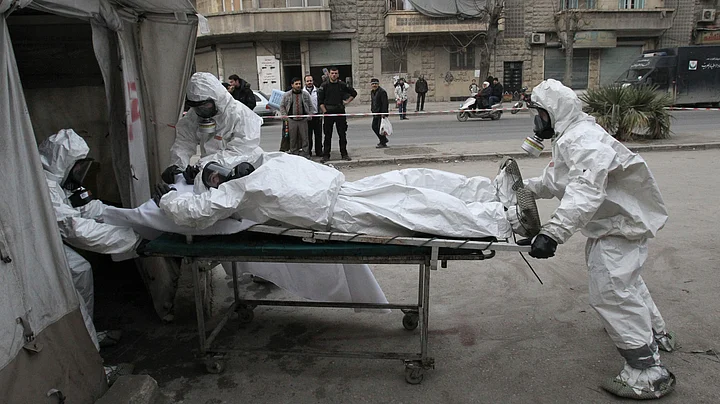Two adults, a three-year-old girl and a five-day-old baby girl suffering from breathing difficulties, inflamed skin, red eyes and conjunctivitis, were treated at an Medecins Sans Frontieres (MSF) run hospital in Aleppo, Northern Syria on Tuesday.
The family arrived at the hospital an hour after ISIS fighters attacked an area where they have been battling rebel fighters for days. Three hours later, they developed blisters and their breathing difficulties worsened. MSF staff treated them and gave them oxygen before transferring them to another hospital for specialised treatment, authorities told agencies.
MSF said that the symptoms are suggestive of exposure to chemical agents.
MSF has no laboratory evidence to confirm the cause of these symptoms. However, the patients’ clinical symptoms, the way these symptoms changed over time, and the patients’ testimony about the circumstances of the poisoning all point to exposure to a chemical agent.
— Pablo Marco, Programme Manager, MSF, Syria
After a mortar shell hit their home, a yellow gas filled the living room, the family said. Evidence suggests that the victims belong to the town of Marea, north of Aleppo, 20 km south of the border with Turkey, where Islamic State recently launched a new offensive against Syrian rebels. The town had been under intense bombardment by mortars and artillery for a week, MSF said.
Not The First Time
If it was a chemical attack, it is impossible for us to ascertain who was responsible.
— Pablo Marco, Programme Manager, MSF, Syria
Islamic State had used poisonous gas in attacks against Kurdish-controlled areas of northeastern Syria in late June, a Syrian Kurdish militia and a group monitoring the Syrian conflict said.
As the Peshmerga fighters attempted to seize a vital supply line used by the Sunni militants. A 120-millimetre chemical mortar shell struck the fortifications at a Kurdish military position near Mosul Dam in June, causing several fighters in close proximity to it to become ill. The shell had a broken tail, and a liquid that emanated a powerful odour of chlorine and caused irritation to the airways and eyes was leaking from it.
Such a shell had been found in the conflict for the first time, The New York Times reported.
Upon impact, the projectiles released a yellow gas with a strong smell of rotten onions. Our troops exposed to the gas experienced burning of the throat, eyes and nose, combined with severe headaches, muscle pain and impaired concentration and mobility. Prolonged exposure to the chemicals also caused vomiting.
— People’s Protection Units (YPG) told Mail Online
In addition the YPG added that the impact sites were stained with a liquid that turned from green to yellow on contact with sunlight.
According to an NBC report, about 20 Kurdish fighters developed reactions to chemical exposure following an explosion in Kobani town, near the Turkish border in October 2014.
(They suffered) breathing problems, bleeding from the eyes, skin burns and vomiting. It appears that there was possibly a poisonous attack of some sort, maybe phosphorus or something.
— Idris Nassan, Kurdish official told NBC News
What if the ISIS has Potent Chemical Weapons?
Chemical weapons are geographically bound. Their damage, though potent is no where near what a nuclear war head can inflict.
Does that make the issue less serious? No.
Because when it comes to the ISIS — beheadings, kidnappings, firing squads and sex slavery are eclipsed by the enormity of the problem that chemical weapons can become.
The boots on the ground may be shielded by use of drones or aerial tactics.
But what about the citizens?
What if the usage were to extend its reach? What if in the next attack the weapons no longer remain rudimentary?
The incidents mentioned above and several others, many of which may have gone unreported may just be the tip of the iceberg. The ISIS perhaps will not agree to the surrender of its chemical weapon stockade.
The question to be asked in that case is, what is the future course of action?
The answer may have to be provided faster than deliberations in the United Nations can provide.
(With inputs from Reuters)
(At The Quint, we question everything. Play an active role in shaping our journalism by becoming a member today.)
